A wake up call to the great divide between the many faces of a country, and what tourists do and do not see, in Thall, Pakistan.
As tourists and travelers, we barely scratch the surface of the countries we visit, though we like to think otherwise.
Consider your own country for a moment; how little a visitor would understand it after only visiting a handful of famous sights, or speaking with locals for a moment or two. They’d only have a feel for the tip of the iceberg… if even.
We come to this realization in Pakistan often. There’s a massive disparity in this country between the rich and the poor, men and women, but it’s not something we’re truly confronted by often.
Because we speak English, our friends throughout the country are inevitably affluent. They’re well educated enough to converse with us on a deeper level, and well off enough to relate to us in terms of lifestyle. Our Pakistani followers are much the same: equal amounts of men and women educated enough to speak decent English, and mostly wealthy enough to have some kind of interest in travel.
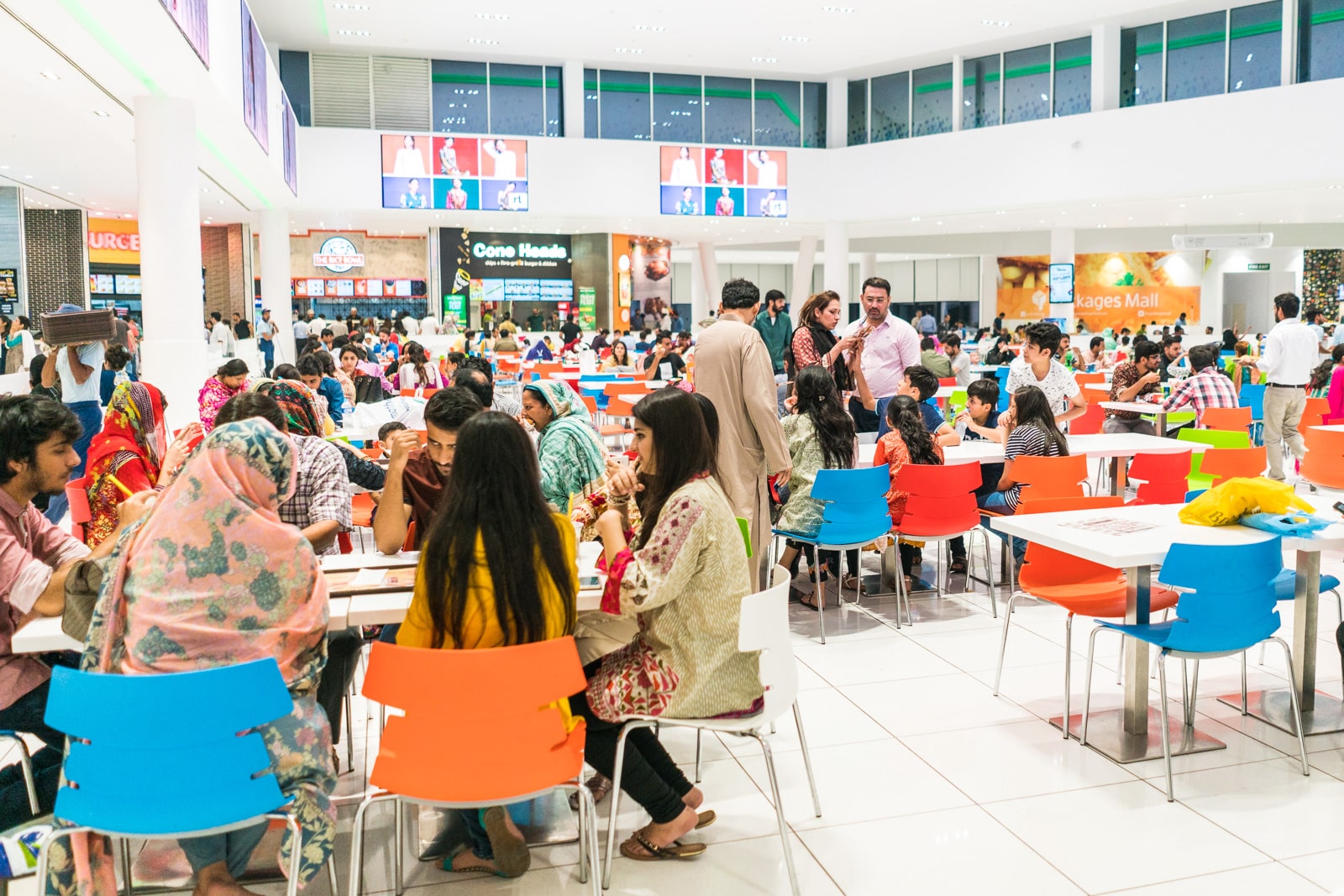
Malls in Lahore: boys and girls hanging out together, heads uncovered, western clothes, chic food outlets. This is a developing country?
In the cities, we ride around in Ubers and Careems, meet boys and girls at malls, and are taken to meals at fancy—often Western—restaurants. I rarely cover my head, and sometimes go without wearing a dupatta in urban areas. Sebastiaan is able to freely converse and snap selfies with the women we meet.
Our lives are usually quite comfortable in Pakistan, which makes the niggling feeling of guilt in the back of my mind that much more pronounced. We are, much of the time, traveling in a bubble—this is not how the majority of Pakistan’s population lives, despite some of our friends’ and followers’ claims.
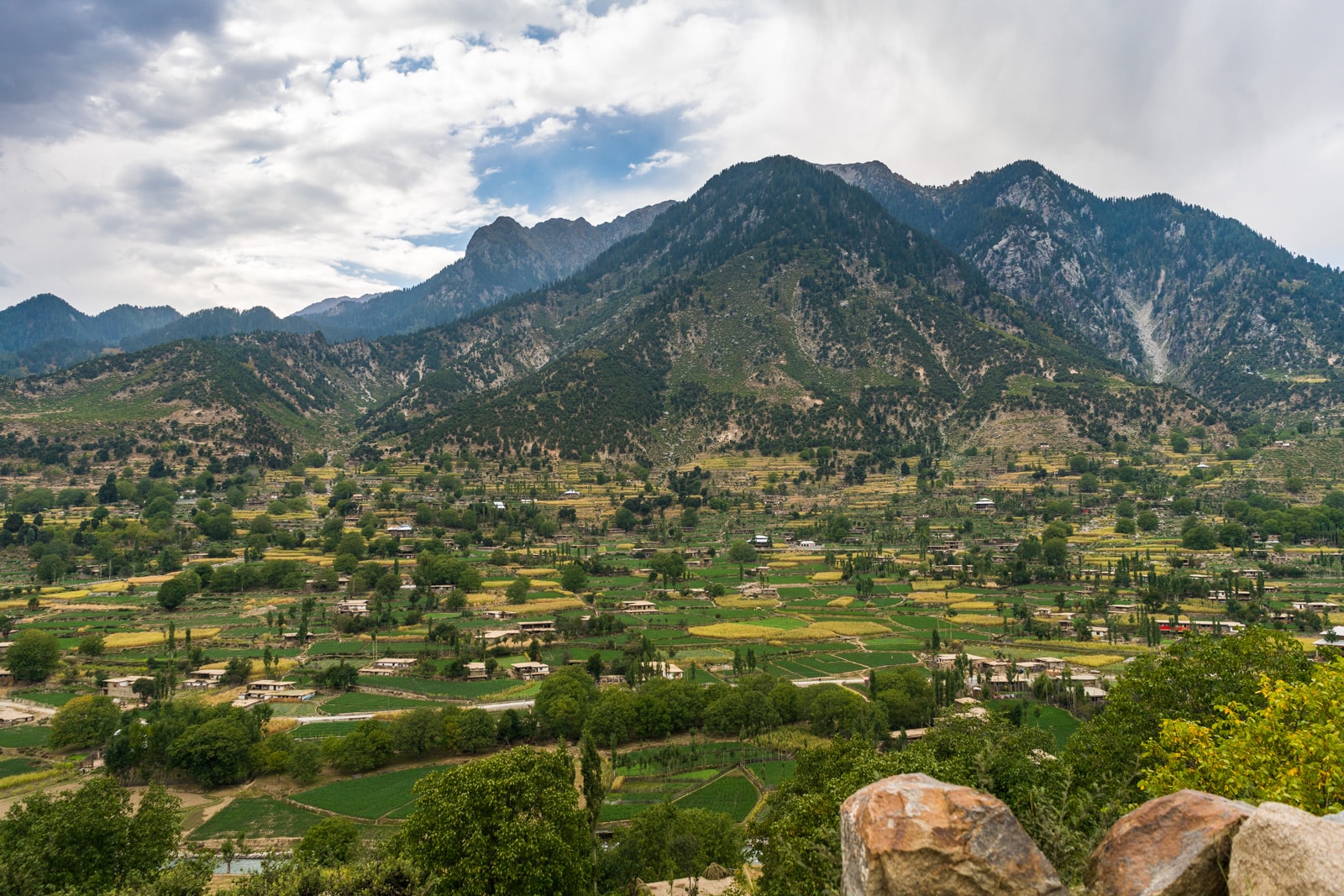
Thall, Pakistan
Another side of Pakistan
Several days ago, we drove into the village of Thall in Khyber Pakhtunkhwa province… and were instantly struck by a reminder of this great divide.
Far removed from glitzy malls filled with girls in tight Western clothes in Karachi and Lahore, the women of Thall walked dirt streets lined with stone and wood houses while swathed in black. Rather than the embroidered burqas made famous by Afghanistan, or the formless black burqas donned primarily by Arab women, all of Thall’s women had simple black sheets draped over their body and face. The sheets had no opening for their eyes, and so the women floated through the streets like faceless black ghosts.
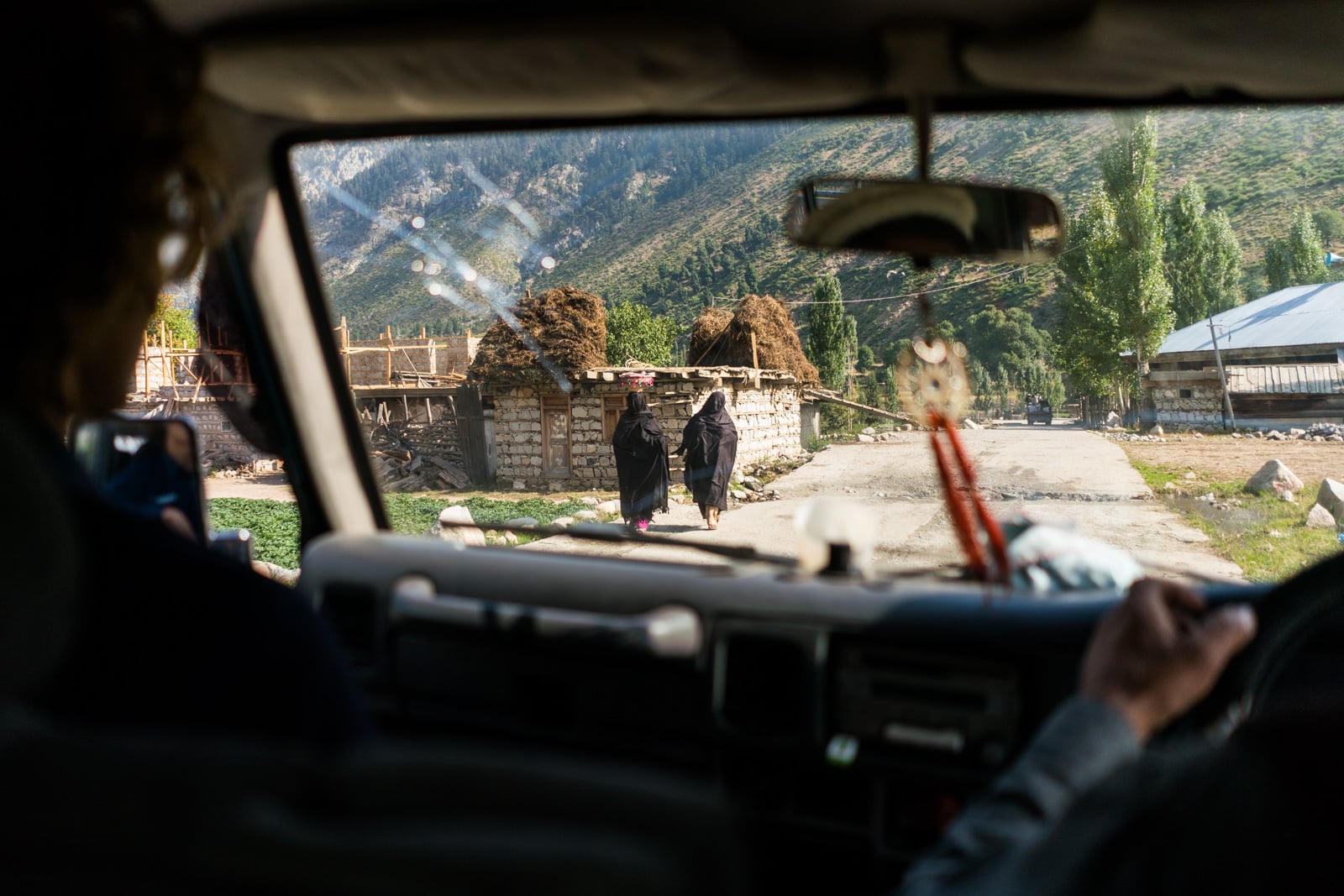
The ghosts of Thall
This was not the first—nor the last—time we found ourselves amongst women completely covered in the name of purdah, modesty.
Blue burqas were ubiquitous in our Afghanistan travels, and the same style of burqa is found all throughout Pashtun Khyber Pakhtunkhwa province in a variety of colors. I’ve grown as accustomed to the covering as I’ll ever be, and it was easier to do than I’d like to admit. Shame me as you will, but it’s not unlike the way many of us are desensitized to images of starving Ethiopian children or underage Indian mothers on the television; we know they exist, and feel a semblance of sadness, but we’ve seen them so many times that they’re no longer noteworthy. They’re simply a world apart.
In the same way, I find it dangerously easy to forget that under each faceless burqa or sheet is a complex woman with her own story and struggles in life.
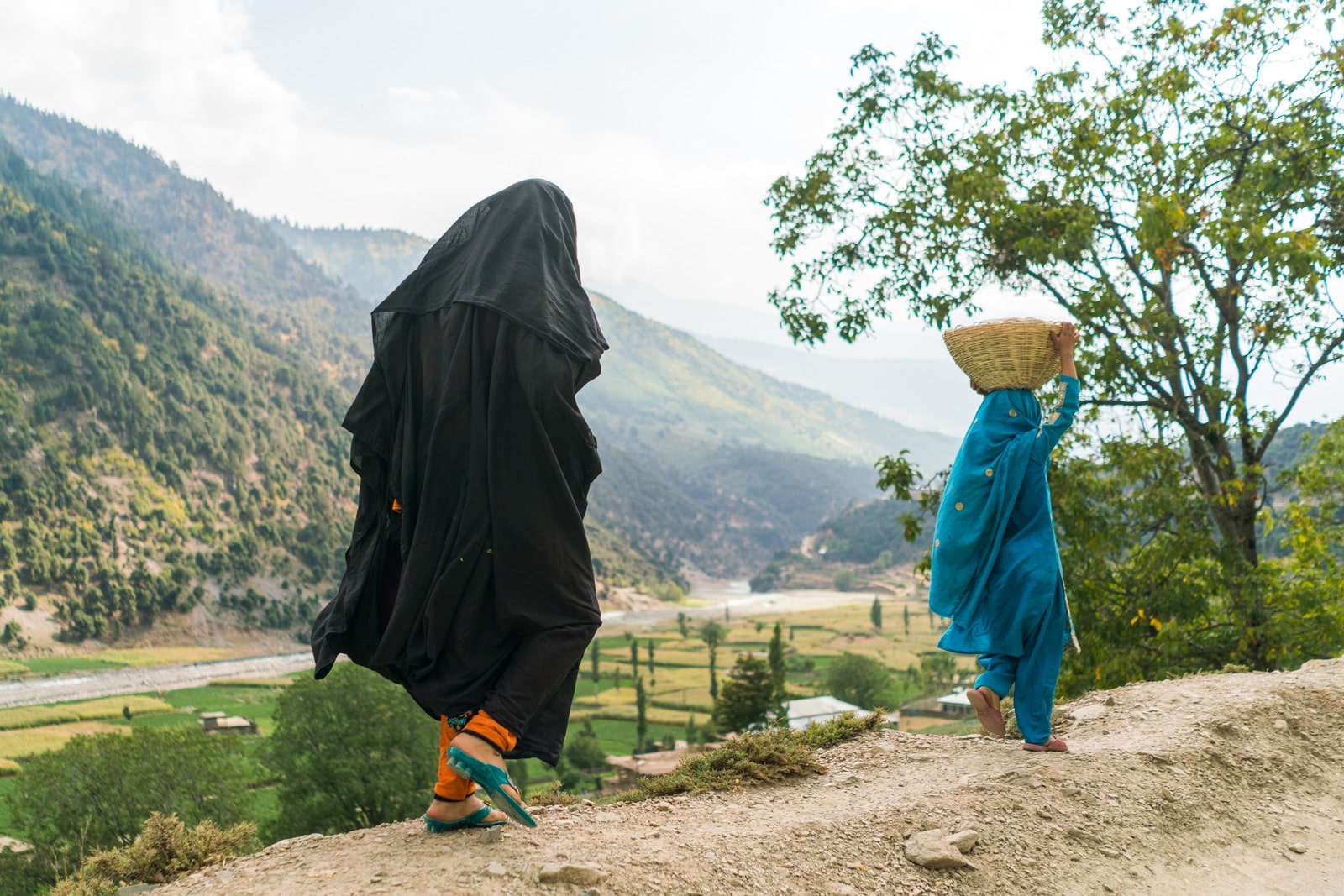
Lady in black
That is, until we spent time in Thall. There, for the first time, I had a chance to meet and interact with the women underneath the veils, to spend time beyond the literal and figurative curtains that divide the men and women’s worlds in this region.
Behind the curtain, beneath the veil
Bakht drove the shared Jeep from Swat Valley to Thall. He was a small, mustachioed man sporting a gray vest and white Pashtun pakol, with an ID card in his wallet that proclaimed him a “Peasant Worker”. He seemed quite jolly, despite speaking only basic English.
Upon our arrival in Thall, he invited us to stay in his home. The building was divided into two sections: one living area hidden behind a curtained doorway, and another area for guests. Bakht sat with us and watched TV in the guest area, his two small sons occasionally bringing us tea and snacks as we switched between English Al Jazeera news, Indian soap operas, and the Japanese NHK channel. No signs of life came from the other side of his house.
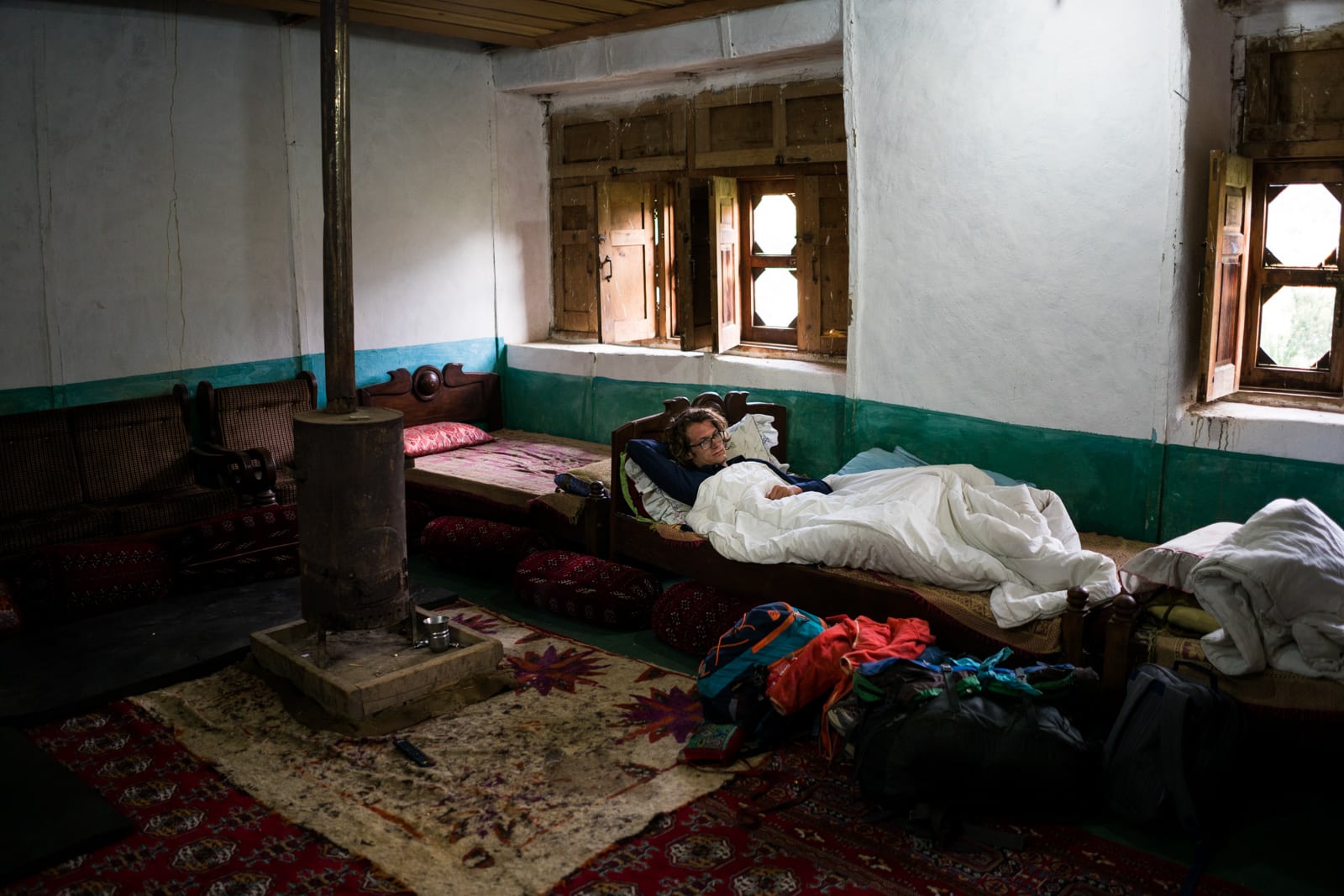
Guests only
Eventually, Bakht stepped out for a moment. Within minutes of his departure, a young girl of 12 or 13 stood in the doorway of our room, beckoning for me to join her. Big brown eyes stared pointedly at me, and braided brown hair peeked out from underneath her red velvet hijab. I got up to see what she wanted, and she grabbed my hand in a vice grip, forcibly steering me into the living area behind the curtain.
Curious eyes of at least ten women and children greeted me from the other side. In the span of a few seconds, they all surrounded me. The young girl who brought me there introduced herself by taking a pen and carefully printing her name on my hand in crude letters: Z A i N A B.
Zainab began interrogating me with questions in Kohistani, the local language, at a rapid fire pace. All I could do was shrug and smile as the other women cackled at my cluelessness and my inability to speak Urdu.
While I deflected the Kohistani inquisition, more and more women stepped through the back door of the house. They entered as faceless black ghosts, but quickly pulled off their cloaks to reveal beautiful people underneath. There were aquiline noses and hooked noses, dyed red hair and pitch black hair, piercing blue eyes and deep hazel eyes. The women were stunning both in appearance and in diversity; their only unifying aesthetic were the black cloaks hanging around their shoulders.
Fireballs
Contrary to my mental image of local women as silent and demure, these women were definitively feisty.
They pulled off my headscarf to examine my hair, clicked their tongues at my woefully unruly eyebrows, snapped my bra to check its make, and fondled my breasts to see how big they were (they were disappointed). Upon learning that I had no children—“Bachha nehi”, no children, I tried—one girl frowned. She repeatedly asked me if Sebastiaan and I had sex, using a violent fisting motion between my legs to make sure she got her point across. Another girl rifled through my bag, looking for any and all entertainment.
Upon finding my mobile, the crowd of ladies pulled closer together as they insisted I flick through all the photos on my phone. Uninterested in our Instagram photos, they were far more intrigued by photos of Sebastiaan, and an old photo of me and my best friend standing with my mother in sleeveless dresses. The girls zoomed in on our bare arms and my open chest, discussing amongst themselves as they experimented with pulling up their own sleeves and peering down my kurta to see if my breasts looked the same as in the photo.
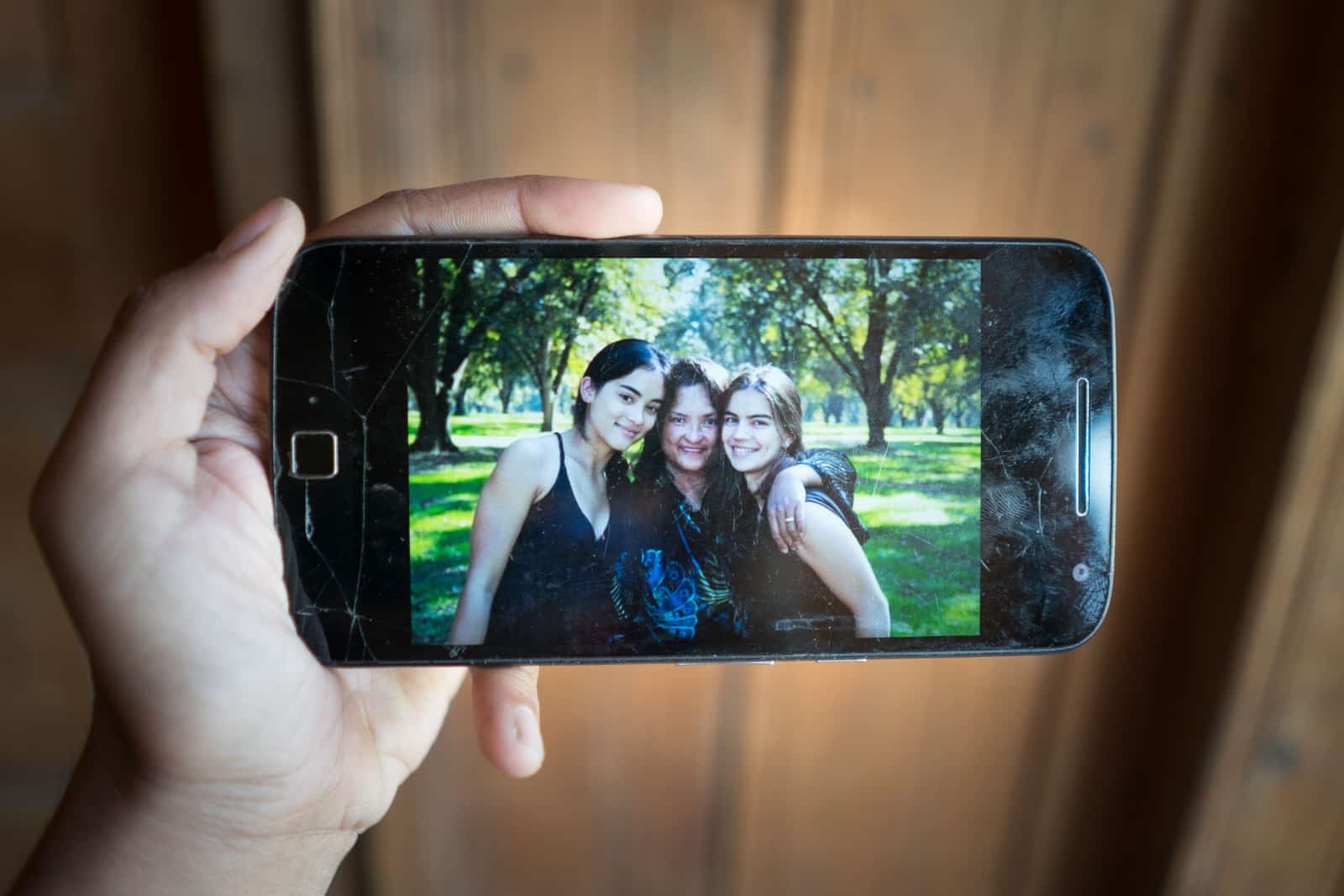
Scandalous!
As the women scrolled through my photos, Zainab continued to shoot questions at me. Realizing that Kohistani questions would get her nowhere, she switched gears, and began asking me how to say certain words in English. She was a quick learner, and repeated the words under her breath like a mantra for the rest of the evening: “Boobs. Nipple. Flower. Brrra. Husband. Ba-gina.”
Eventually, the circus got on the road, and I was paraded around the neighboring houses to the delight and amusement of the neighbors. Behind each door were far more women, young girls, and half naked babies than I ever imagined.
In one house, the girls shook their heads over my thigh-length kurta, saying it was far too short for Kohistani women. In another, one of the girls filled up a clay water jug and placed it on my head. My neck crumpled almost instantly, and the girl, laughing, moved it from my head to hers, grinning as she showed off how easily she could walk with it. No hands necessary.
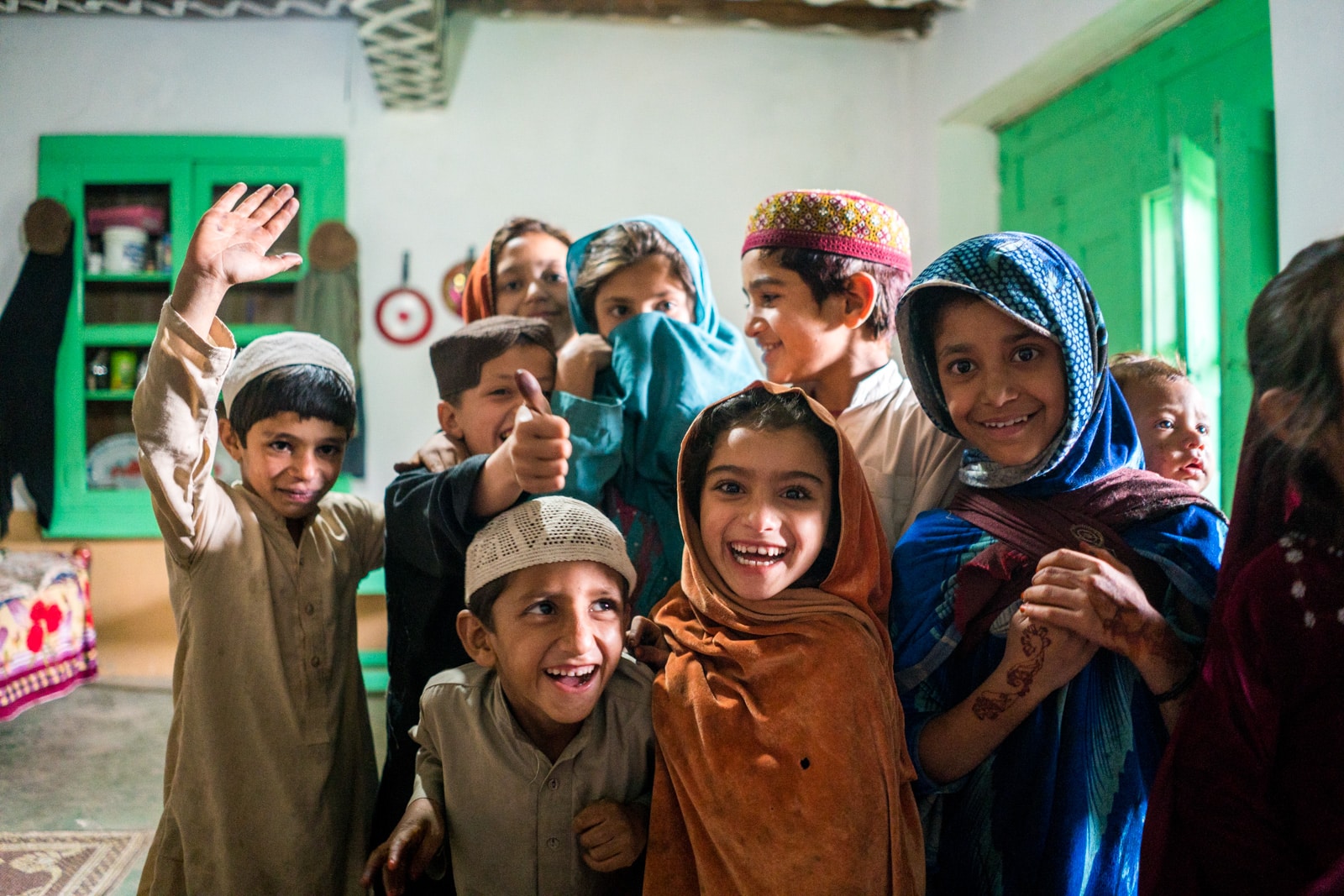
Many of the women were afraid to be in photos, but they were more than happy to have their kids in front of the lens.
Women and wallflowers
Some hours later, I sat with Zainab back in her father’s house, carefully printing the word “F L O W E R”, my name, and my phone number on a piece of paper for her. The sound of shoes crunching gravel announced her father’s coming, and she quickly stuffed the paper under her hijab and into her bra. Bakht entered the courtyard, stalking around for some minutes as all the women present tugged their headscarves lower and stared silently at their feet.
As Bakht exited through the curtain door to return to Al Jazeera with Sebastiaan, Zainab whispered to me, “Brother, school. Me, no school.” She motioned to where the paper was hidden in her clothes, making a sad, strained face before glancing significantly at the place where her father stood moments before. Moments later, the women were all chattering loudly once more.
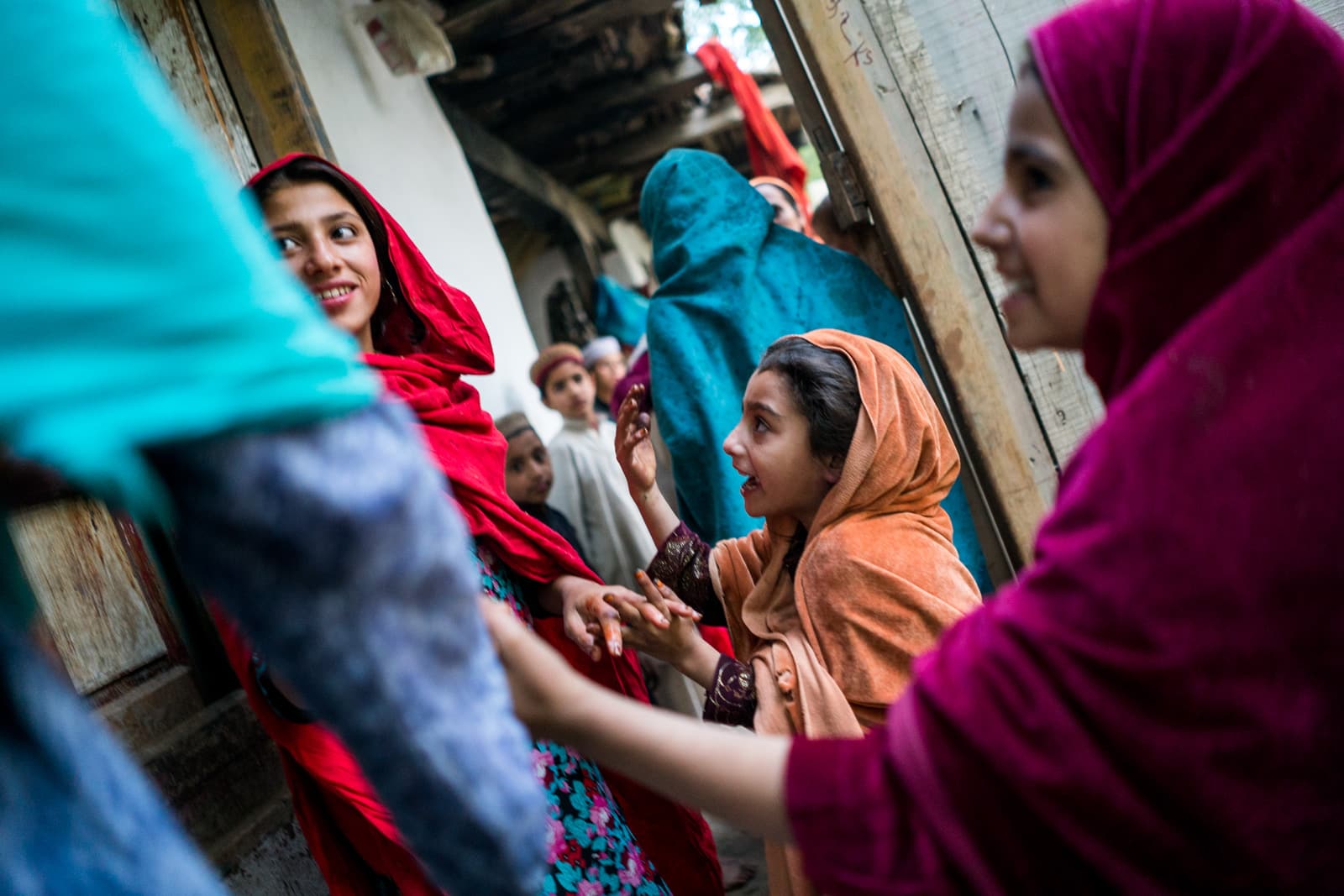
Behind the scenes in Thall
The scene replayed itself countless times that day. When not under masculine surveillance, the women were unstoppable. They cackled at each others’ jokes, showed off their strength by crushing my hands with formidable high fives and handshakes, and did silly things like wrapping me up in their black ghost sheets.
The second Bakht returned, however, the playfulness instantly ceased, and the fiery women were replaced with demure wallflowers once more. Whenever I returned to the guest area of the home, the only signs of the women and girls were eyes peeking curiously through a crack in the door, sneaking glances at Sebastiaan and I.
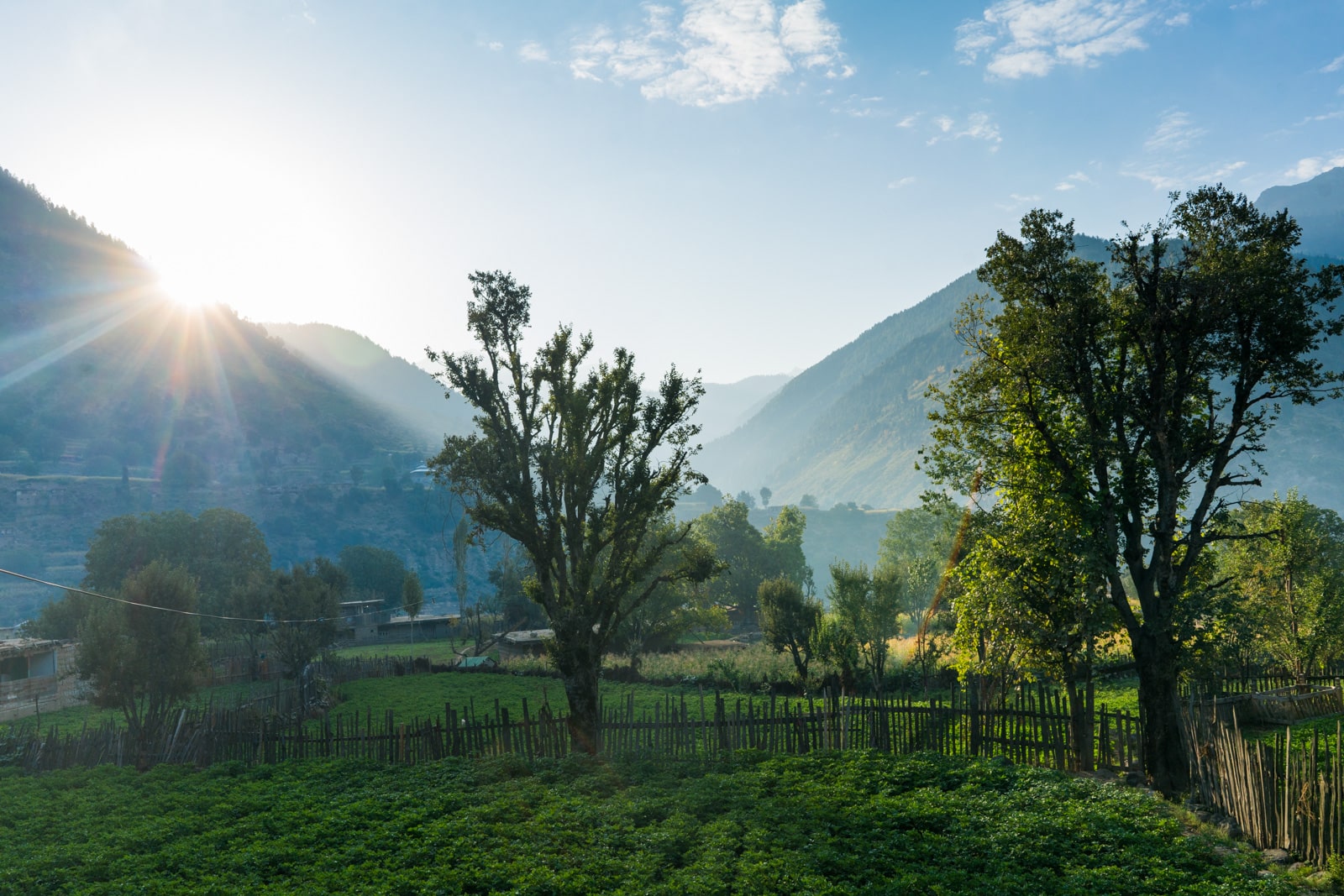
Sunrise over the fields of Thall, Pakistan
What to do?
After months in Pakistan primarily surrounded by men, I was glad to experience life on the feminine side of the divide… but the sentiment was soon lost amidst anger and devastation. It’s one thing to read a book or watch a show about oppressed women, and another thing entirely to see it in action.
I am not a feminist in the contemporary sense. You won’t find me on the streets shouting about women’s oppression, hating men, and banning hijab. I’m a textbook feminist in that I believe women should be equal with men, and have control over their own lives. What a woman does and wears should be her choice, whether she wants to drunkenly pick up boys on the beach in a cheeky string bikini, or face Mecca to worship Allah five times a day in a long black abaya.
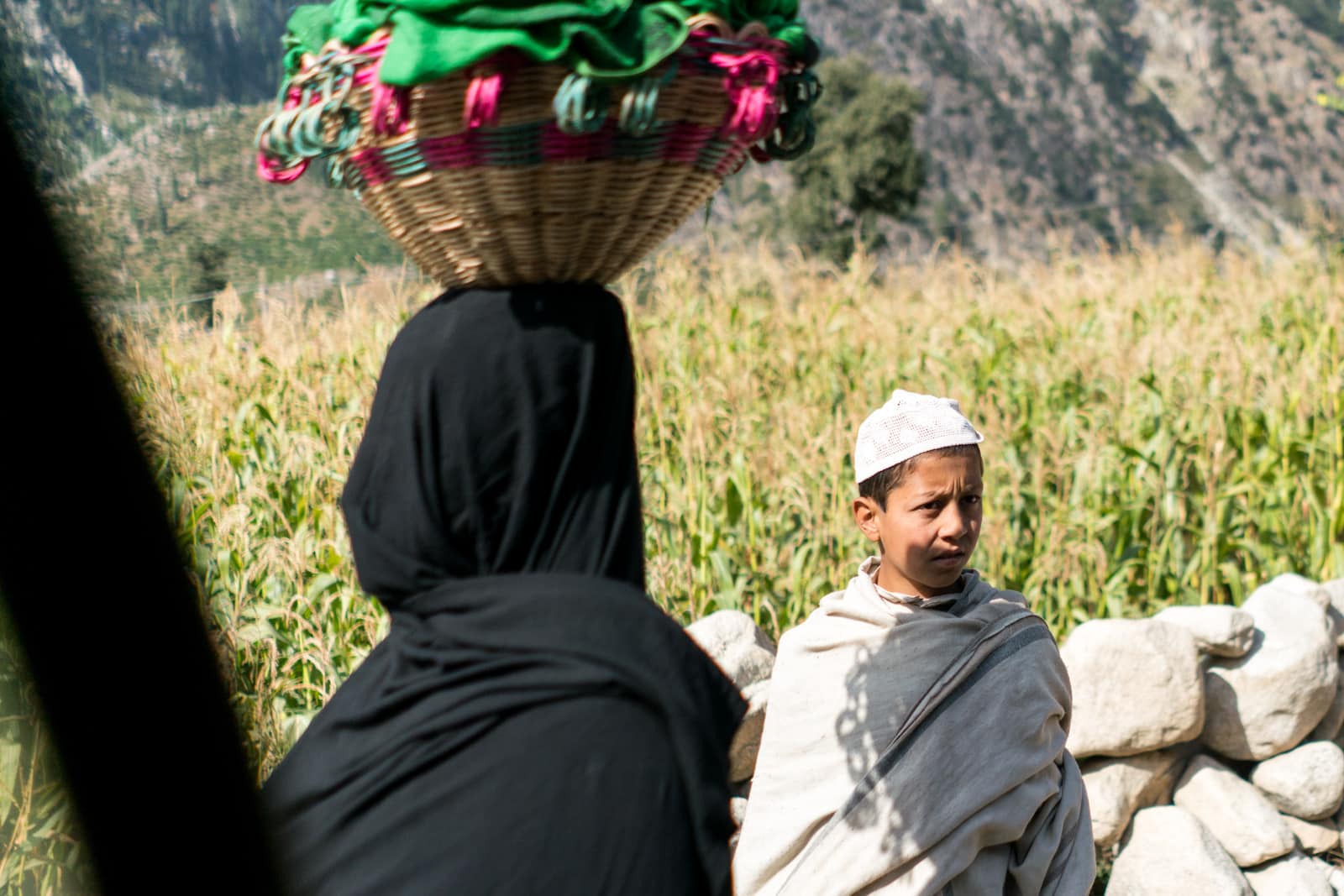
Maybe these women prefer to be protected by men, like staying about the home, and feel safer hiding from prying eyes behind black sheets. Women have told us as much before, but the language barrier was too great to get into such deep discussion with the women.
If that is their choice, so be it. I, as a visitor, cannot apply my own ideals onto someone else’s culture. It’s not my place to dictate how they should live their lives… but I can’t help but think of Zainab’s dismay about not going to school, and be upset over what I saw. How can these women make informed choices and decisions when they’re confined to their homes, prohibited from going to school, and are ultimately subject to the whims of husbands, fathers, and brothers?
For now, there’s not much you or I can do about it, aside from share my experience. I cannot force views on the women or the men—true change comes from within a society, not from outsiders storming in and setting rules. Perhaps with more time, education, and exposure to other peoples, things will gradually evolve to be more equal and open for the women of Thall.
Until then, let this serve as a reminder that countries are often far more diverse and divided than meets the eye. Travel only exposes us to a handful of pieces in a society’s puzzle. Explore and observe, listen and learn, and never assume you’ve seen it all. I’ll be trying to do the same.

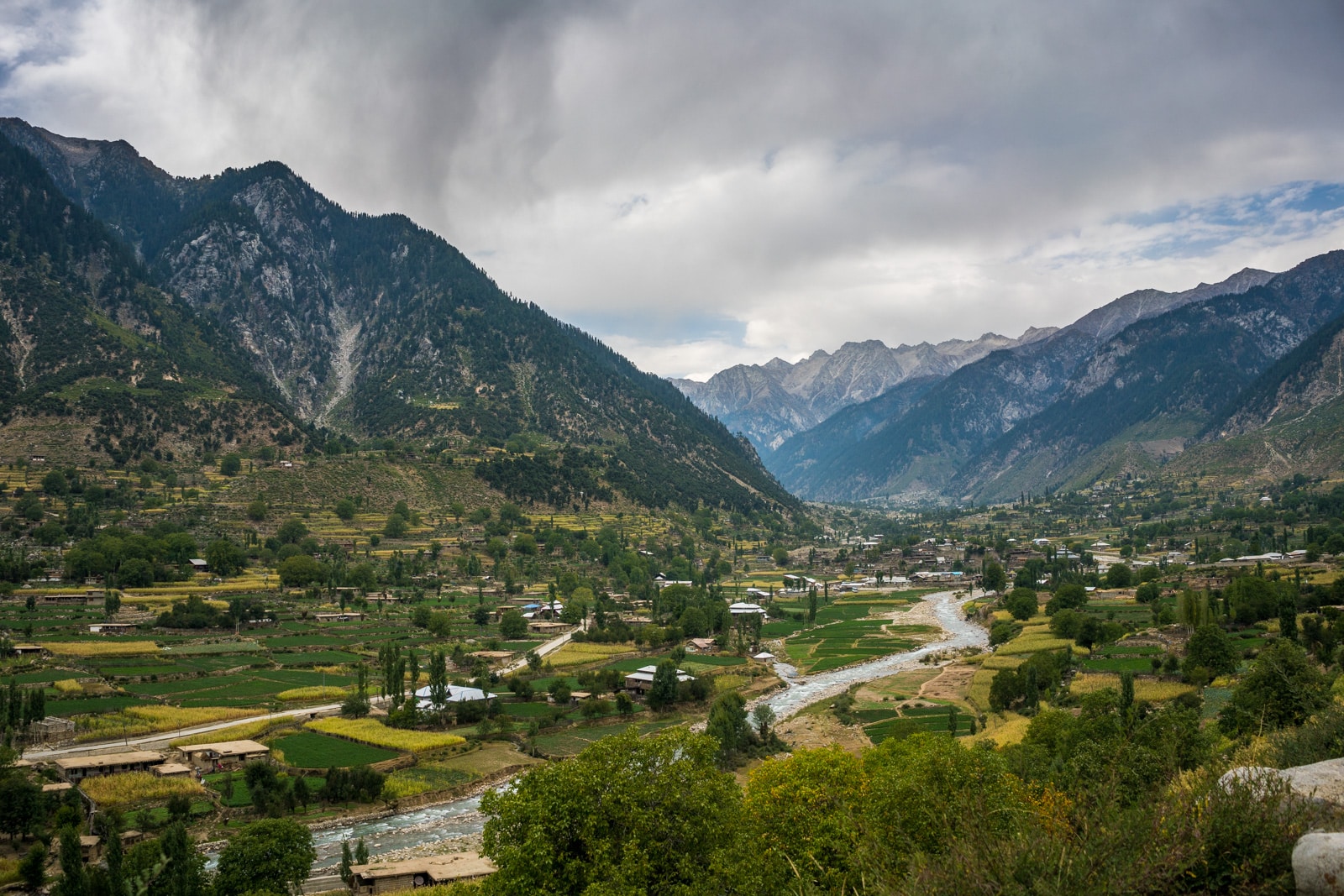


Your travels are so inspiring. Thank you for posting this story.
Thank you for reading it! We’re trying to be more balanced in the images we present these days, so I’m glad you found this interesting as well.
Quite provocative and very well written!! Also beautiful pics. My heart goes out to ZAiNAB and the others. I wish her well.
Wonderful post. Thank you for sharing your experiences.
You’re most welcome!
Very intriguing and heartfelt story!
Whenever Niko and I are in a country or region with a machismo culture, we’re always surrounded by men and I don’t often have the chance to connect with the women either. I haven’t experienced the extremes of which you write yet – or barely – where women are completely oppressed, but I have noticed the difference in a woman’s behaviour whenever a man is near.
The men always address Niko first and sometimes they barely give me a look which makes me feel I’m merely an extension of my partner, but like you, oddly enough I’m getting used to that.
We also encountered moments that, when they ask us about our children and find out we don’t have any, even though I’m already in my 30’s, I get nasty looks or even the blame (one guy told Niko to get rid of me “she no good”). But what can you do in such situations? Even if I try to stand my ground and educate them, they wouldn’t listen to me because my opinion is worth nothing.
It was painful to read how beautiful, funny, smart and feisty these women are when they’re alone and how they have to suppress their personality and strength when a man is near.
Good question, what can we do about it? It’s frustrating to feel powerless at that moment but it’s good that you wrote this story down and get it out there so this issue can get more awareness. Let’s be positive and hope that there will come a change one day because – even though I’m also not a feminist – I believe that all women should have equal rights. And let’s be honest here, what would the men do in these countries and cultures if suddenly all the women would disappear. They wouldn’t be able to take care of themselves, feed themselves, … they would be lost but unfortunately they aren’t aware of that.
I really enjoyed this article because it rightly depicts the patriarchal mindset and how bad it is for local women.
On the positive side, it is far better from say 10-20 years ago and with education, the big game changer, becoming more accessible, it is hoped that women will be given their due rights soon.
Thank you and keep writing.
Seeing at your videos I never thought, that you could also write such well.What ever you came across is unfortunate but at same time true, it used to be similar in our part of country as well, though women in Punjab weren’t that accustomed to covering as women in north of our country were, but still there were boundaries and there were limits.Growing up in this country at times i saw equality and on other patriarchy but the good thing is that the attitude of masses is changing and our middle class and the manner in which it has evolved is a testimony of it, i am very hopeful for our future, Pakistan is gradually changing.My maternal Grand father {Nana} who was against my mother pursuing her higher education when now not only supports but financially helps my female cousins becoming doctor, it speaks to me all.Time, exposure and most of all awareness change the physique of societies.Same is happening here.
Great stuff Alex, always delightful and informative. I’m always jealous of the female travellers in Pakistan. You get a much more complete view of a complex society. Returning in Spring 2019 for my fourth bicycle tour.
Really enjoyed reading it, the way it is composed and expressed; assuming myself in your situation. I wish, these women can also live their life accordingly but it will be changed soon with time and awareness.
My wife and I travel on our beaten up 4WD to the mountains for camping and as she loves to drive on those rugged mountain roads, half the time it’s her behind the wheels. We get a lot of amused stares along the way as people in those areas are not accustomed to seeing women out on the street much less one that drives around, often challenging them by over-taking them, and thus hurting their male ego.
I feel comfortable wearing shorts while she’s comfortable in her jeans. I remember once I was refused a hotel room because I was wearing shorts and another time a local woman in Neelum Valley criticized my wife for wearing an unislamic dress of “Jeans and T-shirt”. But we take it in our stride, knowing there’s world of a difference between the cities in Pakistan and conservative areas like these still coming to terms with the social changes happening around them.
I almost never write comments on articles, but this one really deserve’s it.
Your writing style makes me feel like reading a book, you don’t want to lay aside.
Congratulations, you were able to experience a situation like this. These are the moments, that (even if uncomfortable) really make us start thinking and appreciate the live we are allowed to life. Equal rights for all people.
By the way, your photography in Instagram is brilliant. I wish I will have the courage to ask people to take pictures of them in the future.